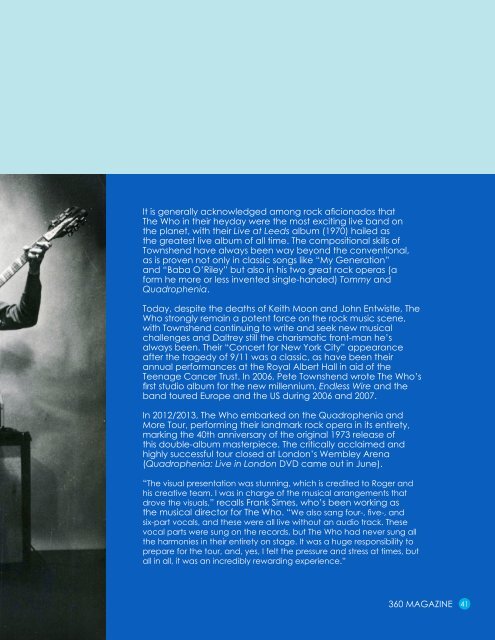1rUn3Zf
1rUn3Zf
1rUn3Zf
Create successful ePaper yourself
Turn your PDF publications into a flip-book with our unique Google optimized e-Paper software.
It is generally acknowledged among rock aficionados that<br />
The Who in their heyday were the most exciting live band on<br />
the planet, with their Live at Leeds album (1970) hailed as<br />
the greatest live album of all time. The compositional skills of<br />
Townshend have always been way beyond the conventional,<br />
as is proven not only in classic songs like “My Generation”<br />
and “Baba O’Riley” but also in his two great rock operas (a<br />
form he more or less invented single-handed) Tommy and<br />
Quadrophenia.<br />
Today, despite the deaths of Keith Moon and John Entwistle, The<br />
Who strongly remain a potent force on the rock music scene,<br />
with Townshend continuing to write and seek new musical<br />
challenges and Daltrey still the charismatic front-man he’s<br />
always been. Their “Concert for New York City” appearance<br />
after the tragedy of 9/11 was a classic, as have been their<br />
annual performances at the Royal Albert Hall in aid of the<br />
Teenage Cancer Trust. In 2006, Pete Townshend wrote The Who’s<br />
first studio album for the new millennium, Endless Wire and the<br />
band toured Europe and the US during 2006 and 2007.<br />
In 2012/2013, The Who embarked on the Quadrophenia and<br />
More Tour, performing their landmark rock opera in its entirety,<br />
marking the 40th anniversary of the original 1973 release of<br />
this double-album masterpiece. The critically acclaimed and<br />
highly successful tour closed at London’s Wembley Arena<br />
(Quadrophenia: Live in London DVD came out in June).<br />
“The visual presentation was stunning, which is credited to Roger and<br />
his creative team. I was in charge of the musical arrangements that<br />
drove the visuals,” recalls Frank Simes, who’s been working as<br />
the musical director for The Who. “We also sang four-, five-, and<br />
six-part vocals, and these were all live without an audio track. These<br />
vocal parts were sung on the records, but The Who had never sung all<br />
the harmonies in their entirety on stage. It was a huge responsibility to<br />
prepare for the tour, and, yes, I felt the pressure and stress at times, but<br />
all in all, it was an incredibly rewarding experience.”<br />
360 MAGAZINE<br />
41


